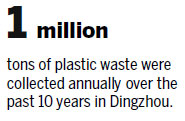Recycling plant to help clear Hebei air
Updated: 2015-11-10 08:01
By Zhang Yu and Wang Wei in Dingzhou, Hebei(China Daily)
|
|||||||||||
A major recycling plant is to be built in Hebei province.
The base, in Dingzhou, will mainly collect plastic waste from other cities in the province, as well as Beijing and Tianjin.
For the past 10 years, Dingzhou has collected more than 1 million metric tons of plastic waste each year, over 60 percent of which was from the Beijing-Tianjin-Hebei region, according to Yin Ruotian, a government official in Dingzhou.
At present, more than 1,700 tons of plastic waste are collected from the region and gathered in Dingzhou each day, Yin said.
"The integrated development of Beijing, Tianjin and Hebei has given impetus to the development of the base, which will help to improve the region's environment," Yin said.
The base, which is about 200 kilometers from the capital, will cover an area of 667 hectares when it is completed in 2018.
The first phase, which covers an area of 313 hectares and cost 10 billion yuan ($1.57 billion), is already in operation.

More than 200 small businesses currently collect the waste, spread across local villages, as well as Beijing and Tianjin.
In the future, the service will be expanded to include rubber, mechanical and electronic products and scrapped motor vehicles.
To better service these enterprises, the base will also develop supporting industries such as logistics, said Fan Dongliang, general manager of Hebei Yingyuan Renewable Resources Development Co, which manages the base.
"It was designed for the transition of local workshops, but now the base seems more useful for improving air quality in the region," Yin said.
Yin said the industry of recycling waste plastics has existed in villages around Dingzhou for 30 years, mostly operating from small family workshops.
The workshops used to process plastic waste with simple equipment and without any stringent environmental protection measures.
"Since it is an almost zero-cost business, small workshops emerged in villages, and villagers always evaded environmental restrictions by working at night," he said.
The villagers would crush used plastics, such as sports trainers, to make plastic granules that were sold to chemical manufacturers for reuse.
But the process created waste gas, water and solid waste, causing pollution, Yin said.
"Now, the base can provide a platform to gather the workshops and attract other large enterprises, which can use environmentally friendly facilities for free," Fan said.
Xue Chaohua contributed to this story.
Contact the writers at zhangyu1@chinadaily.com.cn
Today's Top News
Britain can survive outside EU: PM Cameron
WADA recommends banning of Russian athletes
Myanmar parliament speaker concedes election loss
'No chance of settlement' between Alibaba and Kering
Two pandas moving to Dutch zoo from China
UK unveils new spying powers, raising privacy fears
UN chief commends efforts by China, France to push for climate pact
China and Europe to jointly fund scientific research and innovation
Hot Topics
Lunar probe , China growth forecasts, Emission rules get tougher, China seen through 'colored lens', International board,
Editor's Picks

|

|

|

|

|

|






